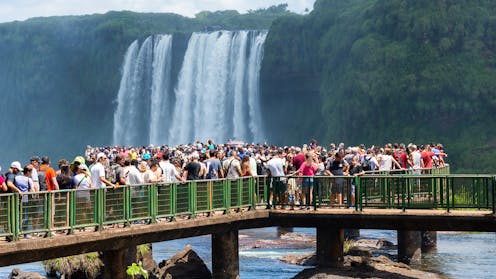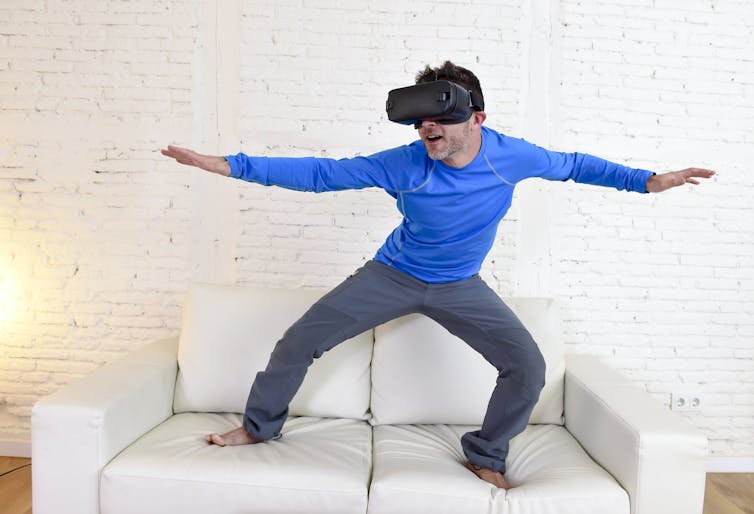
Tourism is not always welcomed by the people who actually live in the places so many of us want to visit. Big crowds can bring economic benefits, but they can also price out the locals and cause environmental damage.
Some blame Airbnb. Others blame the cruise ship operators, the retired “boomers” or the growing middle classes across the world, with their disposable incomes and insatiable appetite for selfies.
But one element which often gets overlooked is the role of technology.
Historically, new transport technology has been a huge driver of the tourism industry. In the UK, for example, 19th-century railway expansion introduced mass tourism to coastal towns including Bournemouth and Blackpool.
In the 1960s, cheaper air travel did the same for destinations abroad, with places such as Majorca and the Spanish Costa del Sol becoming accessible to hoards of new visitors.
But new modes of transport are no longer the main driver of mass tourism. There are no imminent new ways of travelling by land, air or sea which will fuel change in the industry in the way that trains and planes once did.
Now the effects of technology are more subtle, as the online world transforms the way we travel across the real world.
The internet has blurred the distinction between residents and tourists. The surge in working from home, itself made possible by the internet, means that some people can live where they like to play, instead of prioritising proximity to the office or commuter trains.
Then there are the “digital nomads” who embrace the idea of remote working to the extent that they are able to live anywhere in the world with a decent internet connection.
The rise of social media has also had a big impact on tourism, spreading stories and images about previously little-known attractions. A few viral videos can quickly turn quiet backwaters into travel hotspots.
Just ask residents of the once-quiet Italian ski resort of Roccaraso, which was overwhelmed by a surge of visitors in January 2025 thanks to some Tiktok videos by the Italian social media influencer, Rita De Crescenzo.
The online world has also closed a gap which previously existed between tourism destinations and their distant customers. Pre-internet, the global tourism industry relied on travel agencies and printed media. Now, every hotel or resort is a click away, with platforms like Airbnb (which hosted 5 million rental properties in 2024) transforming the sector.
The effects of artificial intelligence on tourism are less certain. But perhaps it could be part of a solution.
Virtual vacations?
AI could be used to help create bespoke, personal tourism experiences in locations that really need tourists, thus reducing the harm caused to overcrowded locations or fragile eco-systems. The travel industry could also use it to make more accurate predictions about travel patterns, helping places like Barcelona and Venice to manage their number of visitors.
AI-enhanced virtual reality also has the potential to let people have experiences of tourism destinations from afar, with research suggesting “virtual holidays” could dramatically change the tourism sector.
After all, many of us have swapped other real-life experiences like shopping and work meetings to something we do via a screen. There is even evidence of an emerging preference for playing online sports over the real-life versions.
But could virtual tourism become so attractive that it significantly reduces the real thing? Will tourists really be content with seeing a virtual version of an artistic or natural wonder, instead of queuing for hours to experience it as part of a crowd?
Similar questions were asked when colour television developed in the 1960s. Would, for example, the vivid portrayal of wildlife in African game reserves reduce the need for tourists to travel there? Who would bother with the expense and effort of going to Kenya or Botswana, when they could be seen up close from the comfort of a sofa?
The outcome, though, was the exact opposite. There is evidence that wildlife programmes have actually stimulated demand to see the real thing. Similarly, popular films and TV shows set in beautiful locations make people want to visit them, with anticipation and expectation adding value to the final tourist experience.

Marcos Mesa Sam Wordley/Shutterstock
So, while we can be pretty sure AI will affect tourism – as it will every industry – we don’t yet know whether its overall impact will be to reduce pressure on the world’s most popular places, or further stimulate demand.
And it may not be technology that has the final say – concerns about climate change and economic pressures may influence global travel patterns first. But one thing is for sure: overtourism is not over yet.
![]()
Adrian Palmer has received funding from British Academy for a study of the role of social media in tourism visits
He is an unpaid member of the UK Government”s Department for Culture, Media and Sports College of Experts. This a non-political advisory research body.


